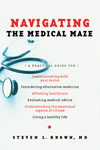 Ever since the serpent enticed Adam and Eve in the Garden of Eden, people have dreamed of easy ways to be god-like. Advertisements today offer to fulfill that dream, promising that supplements can make anyone a superstar. Professional athletes who assert, “Everyone is doing it,” make it sound like pills are the only way to get to the top.
Ever since the serpent enticed Adam and Eve in the Garden of Eden, people have dreamed of easy ways to be god-like. Advertisements today offer to fulfill that dream, promising that supplements can make anyone a superstar. Professional athletes who assert, “Everyone is doing it,” make it sound like pills are the only way to get to the top.
Are there wise shortcuts to fitness? How can you separate false hype from true hope? Here are three principles to help you evaluate supplements, and three examples that apply these concepts.
UNDERSTAND THE HISTORY OF THE SUPPLEMENT INDUSTRY
There are many reasons supplements appeal to us. We all want to find an easy way to success. Popular sports figures give a bad example by risking their careers to use supplements. To make matters worse, our doctors do not seem that interested in fitness issues. It was a change in the law back in 1994, however, that fueled the explosive growth of this industry.
The Food and Drug Administration (FDA) must evaluate all conventional medications before they are sold in this country. The companies who want to sell them must prove to a government panel that they are safe (meaning that the risk of adverse events is low) and that they are effective (meaning that they help people with the illnesses they claim to treat).
In 1994, the Dietary Supplement Health and Education Act created the new category of “nutritional supplements,” distinct from conventional medications. This law exempted these products from FDA evaluation for safety and effectiveness. Since the law passed, even the regulation of food additives (such as dyes) is more stringent than the regulation of supplements.
When a “supplement” turns out to be dangerous, getting it off the market can take years. For example, when Baltimore Orioles pitcher Steve Bechler died from using the weight loss supplement Ephedra in February 2003, doctors had already known for years that Ephedra was dangerous. An FDA ban on Ephedra-containing products still did not go into effect until April 2004. Even after the ban, the supplement industry continued to fight the FDA in court.
It was this legislative protection that led to the explosion of sales, so that nutritional supplements are now a $20 billion industry. Since the claims that they make about their effectiveness and their safety are minimally regulated, the rule for their use is “let the buyer beware.”
DO NOT EXPECT SOMETHING FOR NOTHING
I have a book on my shelf called the Physician’s Desk Reference. It is about three inches thick and it includes information on every prescription medication sold in this country. For each drug, there is information about its chemical formula, what conditions it treats, and what doses to use. Another section describes potential adverse effects. I have never looked at the potential adverse effects section and found it to say simply “none.”
Any drug potent enough to help our bodies work better also has some risk of harm. A chemotherapy drug strong enough to kill cancer cells, for example, will also harm some normal cells. If a conventional medicine makes it to market, it is because the benefits outweigh the risks. For chemotherapy, the risk may be high, since a high risk is justified by the need to kill the cancer. On the other hand, a drug to treat a condition such as high blood pressure will usually have a risk of bothersome side effects less than 5%, and a risk of dangerous side effects that is less than 1%. However, the risk of an effective medication is never zero.
In the same way, if supplements have any value in affecting our health, they will have risks as well. There are now numerous supplements with proven potential adverse effects. Most supplements have not been thoroughly studied for side effects. Before using a supplement, you must do your homework to know the risks. You will never get something for nothing.
Glucosamine: Despite widespread usage, the best study of this supplement, published in 2006 showed that it had no benefit in treating osteoarthritis of the knee.
Saw Palmetto: This supplement is widely used to shrink the prostate. Unfortunately, the best study done on this product showed that it had no benefit.
Echinacea: Sellers claim this product helps with colds by stimulating the immune system. While it seems to do this in the test tube, when studies were done in people, it did not help.
Anti-oxidants: Despite the claim that they prevent cancer, a review of the studies on colon cancer prevention using anti-oxidants published in 2004 showed that instead of being helpful, anti-oxidants were actually harmful.
REASONS FOR CAUTION: DANGEROUS SUPPLEMENTS
Ephedra: This supplement did have modest benefit in weight loss with short-term use. Unfortunately, it also caused heart attacks and death. The FDA took it off the market in 2004.
Androstenedione: A steroid that increases the risk of cancer.
Chaparral: Promoted as a “natural” anti-inflammatory, this supplement can cause fatal liver failure.
OBTAIN WISE COUNSEL
The Bible offers instruction that your body is a temple of the Holy Spirit. When you embrace that understanding, you realize that you have a sacred duty to care for it. That duty is one of the reasons that you read a resource like Faith and Fitness Magazine. When it comes to deciding what pills to take, you must be wise and careful in your choices. Since regulation of the supplement industry is limited, you need to find reliable, independent sources of information.
The first source to use is your own doctor. Your doctor may know more than you expect about particular products. Especially if you are on prescription medications, it is imperative that your doctor knows about any supplements you are considering. Very few studies have tested the interaction of these products with prescriptions medications, but some are known to interact. Your pharmacist may also be able to tell you about potential interactions.
 If the product passes muster there, do a web search that contains the name of the supplement and the term “safety.” You will often uncover safety issues in that way.
If the product passes muster there, do a web search that contains the name of the supplement and the term “safety.” You will often uncover safety issues in that way.
Several web sites are particularly helpful. The website Quackwatch www.quackwatch.com does a great job of exposing treatments that have no value and thoroughly documenting the evidence. It also reviews evidence on products that are helpful.
The general medical website maintained by the Mayo Clinic www.mayoclinic.com includes a section on supplements. This section reviews the evidence and gives each product a grade.
The National Center for Complementary and Alternative Medicine at the National Institutes of Health provides useful information on its website www.nccam.nih.gov. This government organization also provides funding for research on supplements.
Finally, there have been major problems with purity of supplements. Some products have not contained the ingredients that they claim, and many have had dangerous impurities. Because of this problem, you need to look at a site such as www.ConsumerLab.com before you buy. Consumer Lab chemically analyzes products to ensure their quality, so you can find a good source for the product you have decided to use.
Now that you understand the unregulated nature of supplements, have realistic expectations, and know where to get good advice, we will look at some examples that demonstrate how you can do your own research.
EXAMPLE #1 – CREATINE FOR MUSCLE BUILDING
Jack was getting frustrated. He had been working out at the gym for six months now. He played basketball, but he wanted to have a muscular physique like so many of his friends on the football team. He was stronger, lifting heavier weights than he did six months ago. But when he looked in the mirror, he still looked lanky rather than muscular. He saw an advertisement for Creatine in a fitness magazine, and wondered if it would help.
He searched for Creatine on Quackwatch. The article he found https://www.quackwatch.org/01QuackeryRelatedTopics/DSH/creatine.html indicated that this supplement might have some benefits, although the evidence is not definitive. There are also significant side effects, with 1/3 of the users getting diarrhea, for example. In addition, he learned that nothing is known about the safety or effectiveness of long-term use. The Mayo Clinic site contained similar information. He then found some reputable manufactures on The Consumer Lab site.
He decided that Creatine was worth a try, but wanted to talk with his dad about it. His father had been a successful basketball player in college. They enjoyed talking together about basketball training and strategies. After he showed his dad the results of his research, his dad had reservations.
“Jack, you’re a junior in high school, and you’re a starter on the basketball team. You are a great athlete. Why do you want to take something that may not be safe with long term use?”
“Dad, my muscles just don’t have the definition I would like. I want to have a physique like the football players.”
“Jack, in ten years, your teammates will not remember exactly how many ripples you have on your abdomen. They might remember if you sink the winning basket at the state tournament. They will definitely remember if you demonstrate a team spirit on the court. I love you too much to see you take a product that could be dangerous in the long term.”
“Dad, I’m not worried about ten years from now. I want bigger muscles NOW. Anyway, what does being a team player have to do with whether I have muscles or not? That’s a separate issue.”
“What if this stuff gives you diarrhea? That will interfere with your training.”
“What if it doesn’t give me diarrhea?”
“Jack, I see your point, and I know that you can get this stuff whether I approve or not. Why don’t we both think about it and talk again tomorrow.”
When they sat down the next day, Jack’s dad had a couple of options.
“Jack, why don’t we talk to my trainer at my health club? Maybe there are other exercises you can do that will build your muscles in a natural way without taking pills.”
“Dad, I really appreciate that offer. It’s a great idea, and I’d love to do it. But what if I want to take the pills, too?”
“I thought you might say that. My biggest concern is the long-term safety issue. But if you want to take them, why don’t we set some guidelines. What if you try them for a week. If you get diarrhea, then obviously Creatine is not a good choice for you. If you don’t get diarrhea, we take measurements of your muscles and try the pills for six weeks. Then we can see if they really help. If they have helped, maybe we could agree that you’ll just use them for six months instead of forever. I’d feel better about that.”
“Frankly, dad, I’m fine with that. I don’t want to take pills for the rest of my life anyway.”
This first example demonstrates the uncertainty often associated with supplements. It also illustrates that wisdom often involves weighing priorities and looking hard for alternatives to choose the best approach.
EXAMPLE #2 – CALCIUM, VITAMIN D AND STRONG BONES
Susan’s mother, age 78, had just fallen and broken a hip. Now, she was fearful about walking, and was no longer going to her water aerobics class. Susan wanted to be sure that she had strong bones, so that if she fell at 78, perhaps she would not break anything.
Her doctor tested her for osteoporosis, and told her that her bones were still strong. She told her that calcium was clearly a good idea for her. The recommended intake of calcium is three dairy servings a day, and Susan only rarely had more than one glass of milk per day. She also told Susan that doctors are learning that vitamin D deficiency is more common than we thought. Since so much of our requirement for vitamin D is met through sunlight, she explained that those who spend very little time outdoors are more susceptible to this problem.
When she got home, Susan checked out Quackwatch, and found no warnings about calcium as such. There was a warning that “coral calcium” has no value above ordinary calcium https://www.quackwatch.org/01QuackeryRelatedTopics/DSH/coral.html. That would save her a few dollars. There were no real warnings about reasonable doses of vitamin D.
Mayoclinic.com had useful advice about the best time to take calcium supplements https://www.mayoclinic.com/health/calcium-supplements/AN01428. It also had useful information regarding the controversy about vitamin D doses https://www.mayoclinic.com/health/vitamin-d/AN01558. Finally, Susan went to Consumer Lab and discovered that many suppliers have good products https://www.consumerlab.com/reviews/Bone_Supplements-Calcium_and_Vitamin_D/Calcium. Having completed her research, she went to the store and bought some calcium with vitamin D.
 EXAMPLE #3 – EASIER WEIGHT LOSS
EXAMPLE #3 – EASIER WEIGHT LOSS
No matter what Jessica did, she could not seem to lose the weight she had gained when she was pregnant with her son, Jason. She had weighed 130 before she was pregnant, and now she was pushing 170. She had tried all kinds of diets. She would lose ten pounds and then she would lose her motivation and regain the weight. Jason was now 12. She had to do something to lose the weight and keep it off.
She saw ads in a magazine for an herb called “bitter orange” for weight loss, and wondered if this would help her. The next time she saw her gynecologist, she asked about it.
“Jessica, most pills that work for weight loss are adrenaline-like substances. The FDA fought long and hard to get Ephedra, a supplement, off the market because it was killing people. Doctors stopped prescribing Phen-fen, a combination of prescription medications, for the same reason. Products that do not have adrenaline-like effects usually do not work. So your choice in pills for weight loss is either to take something that is dangerous, or to take something that is worthless. Quite honestly, diet and exercise together are the only safe way to go. You know, Jessica, the other issue here is long-term success. Would you want to take those medicines the rest of your life?”
“No. I thought I would just take them until I lose the weight, and then stop them.”
“Jessica, think about your history. You have succeeded in losing weight before, but then you regain it. Don’t you think the same thing would happen if you lose weight with pills?”
“I guess you’re right.”
“The real key to longterm success is to limit the amount of food you eat. I’d be happy to send you to a dietician who can teach you how. Another option is to get into a program that teaches you to eat in a way you can maintain for the rest of your life. Their program also teaches you how to choose foods and amounts that will let you lose weight. The No-Fad Diet book from the American Heart Association is another good resource that takes this approach.”
Although she should have been satisfied with this advice, Jessica still wondered whether she should try pills for weight loss. When she got home, she went to Quackwatch. She did not find much about bitter orange there, but a web search using “bitter orange safety” revealed that there have been reports of strokes and heart attacks in healthy people using this product https://nccam.nih.gov/health/bitterorange. The next day, Jessica started going to Weight Watchers® instead of trying to take shortcuts with her health.
READING THE FINE PRINT
Fitness is a lifelong pursuit that requires daily dedication and commitment. If you were afraid of hard work, you would not be reading this article. When someone offers you a pill as an easier solution, research it carefully first to discover the risks, as well as the evidence for benefit. Determine whether the risks, known and unknown, are in line with your priorities, and be sure to look for alternatives. Some products may help you achieve your goals with reasonable safety, while in other cases, old-fashioned hard work may be the best option. Often we follow our own self-will rather than choosing the wisdom of God. If Adam and Eve had thought more carefully about the risks of the fruit in the Garden, we would all be a lot better off.
Consider potential ways to reach your health goal. (Diet and exercise should always be your first choices.)
Avoid unrealistic expectations. Realize that all pills have risks.
Research supplements you consider. (Talk with your doctor. Search the internet with “the name of the supplement” and “safety.” Double-check the product with Quackwatch and Mayoclinic.com.)
Find a safe supplier. (ConsumerLab.com is one good source of information.)
Set measurable goals.
Re-evaluate after a trial period. (Assess both whether the product has had any benefits, and whether you have experienced any adverse effects.)
Avoid taking any product longer than a few months, since few products have been studied long term.

 Dr. Steven Brown is a practicing cardiologist and Clinical Associate Professor of Internal Medicine at Texas Tech University. He is the author of Navigating the Medical Maze: A Practical Guide. This book uses stories to teach readers the principles they need to get the best possible healthcare for themselves and their families. You can find additional resources through Dr. Brown’s website, www.drstevenbrown.org.
Dr. Steven Brown is a practicing cardiologist and Clinical Associate Professor of Internal Medicine at Texas Tech University. He is the author of Navigating the Medical Maze: A Practical Guide. This book uses stories to teach readers the principles they need to get the best possible healthcare for themselves and their families. You can find additional resources through Dr. Brown’s website, www.drstevenbrown.org.








